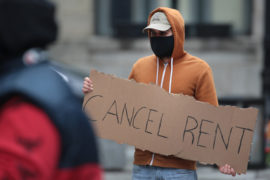Until recently, San Francisco was the only major Bay Area city with rent-control laws to allow landlords to pass on portions of property taxes and mortgage loans, but it no longer stands alone.
The San Francisco Board of Supervisors has passed an ordinance that blunts the ability of rental property owners to increase rents by up to 7 percent on top of the annual allowable increases, to pay down rising property taxes and debt services.
A landlord may still petition the Rent Board to pass through to tenants the costs of certain renovations to the property, which are considered capital improvements — new windows, a roof replacement, or exterior painting, for example.
In deciding whether to nix these pass-throughs, the Board of Supervisors received no shortage of input from a phalanx of tenant advocacy groups and predictably, the rhetoric against “greed-fueled displacement” and “outside speculators” was barbed, falling squarely on the side of tenant advocates.
Although debt service and property tax pass-throughs have been utilized by large corporate landlords and property management companies, they also are used by “mom-and-pop” owners who rely on the pass-throughs to keep themselves solvent. The new law, then, disproportionally impacts these smaller rental businesses owned by predominately responsible, studious landlords who are being saddled with rising costs.
The East Bay Rental Housing Association put human faces on these engaged, positive and compassionate members by profiling several private rental properties owners here, noting they are the providers of the community’s largest segment of safe, clean and affordable housing.
Back when efforts to scuttle debt service and property tax pass-throughs first captured our attention in December 2017, Charley Goss, government affairs managers for the San Francisco Apartment Association, noted that tenants facing financial hardship may apply for an exemption to a pass-through rent hike.
“You want to protect tenants who need protection with hardship petitions, but there has to be a give-and-take with the ability to recoup costs and investments in the property.”
By not engaging in this compromise and instituting a blanket prohibition against rising expenses, the city has dealt a blow not only to Goliath landlords who can absorb rising costs and huge mortgages with less discomfort, but to smaller rental businesses that are already struggling to keep afloat.
As we noted earlier, landlords can still petition the Rent Board for rent increases in other circumstances, but oftentimes, owners are uninformed about their respective rights under the law. Having made regular appearances before rent bodies throughout the Bay Area for over 20 years, Bornstein Law has become well-versed in this nuanced area of law.
As a backdrop, visit our practice page that takes a trip around rent-controlled jurisdictions, or contact our law offices for informed advice.





